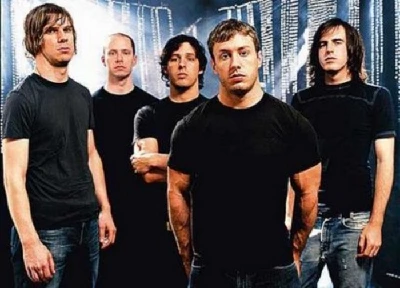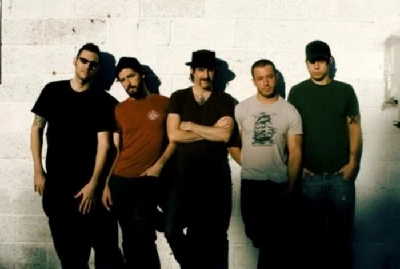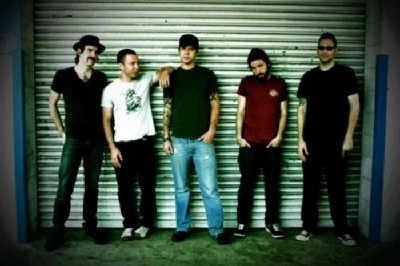published: 29 /
7 /
2010

The Dillinger Escape Plan have been at the forefront of the experimental metal scene since forming in 1997. Guitarist and founding member, Ben Weinman, talks to Paul Waller about his band's history from their formative to their current release, 'Option Paralysis'
Article
Since forming in 1997, New Jersey’s Dillinger Escape Plan have been at the forefront of the experimental metal scene, pretty much inventing mathcore and putting out uncompromising records with each and every release along the way.
Guitarist and founding member, Ben Weinman, talked to Pennyblackmusic about his journey from those formative years through to the band's current release, 'Option Paralysis'.
PB: Growing up what bands or scenes were the catalysts that got you into underground music?
BW: I listened to mostly just radio rock and roll in the 80's. Hair metal was what honestly got me into guitar. Regardless of how cheesy all those bands were they could play well. Eventually a friend from down the street introduced me to more underground metal. He had catalogues from different underground record labels and I would just order whatever sounded interesting.
It wasn't long before I was almost only listening to bands like Morbid Angel and Napalm Death along with more obscure stuff like Disharmonic Orchestra. I then transitioned into more punk stuff like Minor Threat and Black Flag.
PB: Do you think a challenging band such as Dillinger Escape Plan would have been able to survive in the 80’s early 90’s hardcore/punk/metal scenes?
BW: I'm not sure. That is a good question. I mean we definitely would have made more money if we were the same size band we are now, but ten years earlier when the music business was flourishing. On the other hand without people trading music online and checking out our live videos who knows if we would have any fanbase.
As for surviving in the underground scene, we were just as challenging to listeners in the late 90's and 2000's as we would be to anyone in the 80's. People still don't understand what it is we are doing.
PB: I’m sure there have been some but I have never read a bad Dillinger Escape Plan review. With record after record being acclaimed as your best work yet do you find it difficult to live up to expectations record after record?
BW: Not really because we don't use things like reviews or public criticism as a measure for how we write our music. We realize that our true fans embrace us for not trying to follow some rabbit hole path to what we think people want to hear from us. It's impossible to please everyone. At he end of the day the expectations we have on ourselves are so high that it is hard to create new music sometimes.
PB: It’s been a relatively short wait for 'Option Paralysis' compared to the gaps between previous records. Was there any reason for this?
BW: Well, we toured a little less then usual on our last record. I also lived with our current drummer, Billy Rymer, while making the record which helped make good use of time.
PB: With the album a few months old now how have you found things going now you have your own Party Smasher imprint to focus solely on the band? Is it refreshing to be away from a label where everything is not in your control? How stressful has it been?
BW: Things aren't that much different than when we were on Relapse, our previous label We partnered with a French label called Seasons of Mist for this release and they did a great job in helping us realize our artistic vision. From a business standpoint the distribution was a little weaker and there is less of a label presence in the US but we are happy with how things are going.
PB Over the years Dillinger Escape Plan has released some fantastic and groundbreaking albums. Looking back can you comment on some memories you have of either recording, touring or just some general anecdotes of some of your records? Let's start with the 1997 'The Dillinger Escape Plan' and 1998 'Under the Running Board' EPs
BW: 'The Dillinger Escape Plan' was not our first official release, but probably the first release that people considered to have the Dillinger sound that we are known for. I remember writing the first song, 'The Mullet Burden' on 'Under the Running Board' and screaming vocal ideas over a live demo. When I played it for my friend Tom he was like "This is going to destroy everyone!" Things just kind of went uphill from there.
PB: What about the 'Calculating Infinity' album?
BW: We were very excited about everything that was happening for us. We were getting cool tours with great underground bands and we were getting ready to record our first full length record. Then our bass player, Adam Doll, got in a car accident and was paralyzed right after our other guitar player, John Fulton, quit the band to pursue school. It was a very difficult record to make after that but also one of the most rewarding experiences of my life. We recorded it on tape without pro tools in only a little more then 2 weeks. That was the last record we made like that.
PB: What about the 'Irony Is a Dead Scene' EP from 2002?
BW: After touring with Mike Patton's band Mr Bungle we felt very inspired. While looking for a new vocalist after our first singer Dimitri Minikakis had left and before our current singer Greg Puciato joined the group, Mike agreed it could be cool to do an EP together. I sent him demos of the songs and he was in for the win.
I think one of the most memorable experiences I had from that record was the day I went to New York and met up with Mike so he could give me a copy of the demo with some of his scratch vocals on it. I couldn't get back to my car fast enough to see what he had come up with. It was insane to here his voice over songs I had written.
PB: And what about 'Miss Machine'?
BW: This was Greg's first record with us and actually only the second full length we had written. The pressure was on us in every way possible. 'Calculating Infinity' went on to sell more records then any other band on our label when it came out in 1999 and there were a lot of expectations. We were very proud of 'Miss Machine' which came out in 2004, but it was only a small window of our capabilities. This record opened many creative doors for us.
PB: Then there was your third album, 'Ire Works', from 2007.
BW: That record was so difficult to make. Working with a new drummer for the first time in Gil Sharone after our original drummer Chris Pennie left was very stressful. but the camaraderie in the band had never been higher. 'Ire Works' was the first record that I was completely happy with after it was done. No second guessing.
PB: The End The Slaughter campaign against seal slaughter I think is a fantastic cause to back and it’s great to see a band commit to something with inserts and ads like you have. How did you get involved in the campaign?
BW: The most important thing in life is the pursuit of truth, coming to terms with it, and conducting yourself in a way that you feel is honourable in consideration of those truths. There are so many things going on out there that are not only debatably horrible and wrong, but are unquestionably horrible and wrong. We are just trying to do our part to expose some of these things.
PB: You have mentioned a “cultural depression” that you see as the reason for the dwindling record industry rather than file sharing which is the normal soundbite equated to its decline. What did you mean by this?
BW: I meant that because we are all experiencing things in the same exact way at the same exact time with the same exact ease of access, inspiration is very diluted. Technological paradigm shifts are happening at amazing speeds and some of them create great creative outlets. Unfortunately most of the time they just destroy true artistic expression by making things easier and less inspired.
The act of putting myself in an uncomfortable and foreign circumstance in order to experience new music and culture when I was young is the very reason Dillinger exists and is exactly the reason that when we started people thought we sounded original and fresh. Sitting on a computer all day will never produce the same kind of result.
PB: Dillinger has become somewhat an institution over the years. A product with the DEP name on it guarantees quality and forward thinking ideas in relation to music and artwork. Can you see yourself doing this for another ten or fifteen years down the line?
BW: Definitely. We have tried very hard to not put ourselves in to a box so that we can continue to do this in some way shape or form for as long as we want to.
PB: Thank you.
Picture Gallery:-



